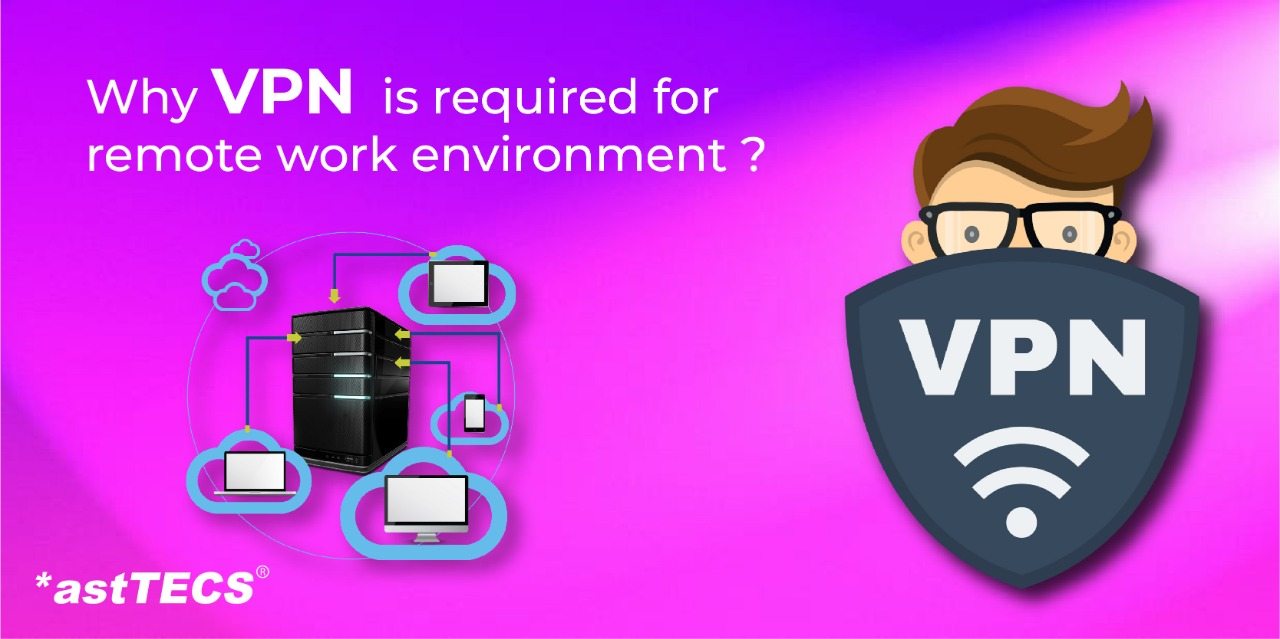INTRODUCTION
Look both ways before crossing the street, don’t share OTP and use a VPN when working online. All of these aren’t thumb rules of life but they should be.
Every 39 seconds, someone attempts to hack a computer or a terminal. Moreover, these hacks account for just around half of all cyber attacks. Hacking, phishing schemes and viruses cost businesses around the world million of dollars every year. Hackers are targeting you, the remote worker, as the latest vulnerability.
The hazards and expenses of maintaining your data as it goes between your computer and your company’s servers are only increasing as a record number of workers work remotely. It’s past time for remote employees to understand how to stay secure on the internet. And it all starts with a virtual private network or VPN.
What is VPN?
A virtual private network (VPN) establishes a secure network connection between your device and the public internet. VPN mask your internet protocol (IP) address and disguise your online identity. Through the encrypted tunnel provided by your VPN, you may access and exchange your information and data safely and securely.
How Does a VPN Work?
Consider it a secure connection between two online destinations (perhaps your home and work, or your favorite website). No one can see what you’re doing in this secret tunnel from the outside. A VPN provides numerous security and privacy benefits. In rare cases, they can even increase your internet speed by bypassing your ISP’s data priority.
When you’re online, your device is constantly sharing data with other users. A VPN connects your device (such as a smartphone or laptop) to the internet over a secure tunnel. The VPN allows you to transfer data to an external server (the VPN server) through an encrypted, secure connection. Your information will then be forwarded to its online destination.
Using a VPN server to reroute your internet traffic offers a number of benefits. To begin with, it aids in the concealment of your online identity. It also protects your information. Finally, it gives you more freedom to use the internet.
Following the establishment of the connection, the following will happen to your data:
- Your data traffic is encrypted and sent to the VPN server through a secure connection via the VPN software on your computer.
- Your Internet Service Provider receives the data as well, but because to encryption, they are unable to eavesdrop on it.
- The VPN server decrypts the encrypted data from your PC.
- Your data will be sent to the VPN server across the internet and you will receive a response that is intended for you, the user.
- The VPN-server encrypts the traffic again before sending it back to you.
- The data will be decrypted by the VPN software on your device, allowing you to understand and utilise it.
Benefits of VPN while working Remotely:
Securely connect to the office
Any link to the internet, as any cybersecurity expert will tell you, poses a potential security risk to your company’s servers. That is why businesses invest tens of thousands of dollars in bolstering their cybersecurity defenses. But what happens when you step out of this haven?
You become a possible weak point in your office’s security from the outside world. A VPN solves this problem by establishing a secure link between you and your workplace. You have access to all of your company’s data while still enjoying the benefits of your office’s security system.
This way, you may work from wherever you want, and your organization can rest easy knowing that their information is safe.
Keep your personal information and identity safe.
A VPN isn’t merely for the advantage of your corporation. Many remote workers do their business entirely online. Whether you’re accessing your banking information, tax records or other sensitive information, you want to ensure your data isn’t exposed. The most significant way a VPN can keep you safe online is by encrypting your data, whether you’re in public or at home. You most likely use free wifi to browse the internet on the bus or at a cafe. Unfortunately, these public hotspots are frequently used to gather your personal information, which can then be used against you in phishing or ransomware attacks. VPNs hide your identity and protect you from scams like these. VPN keeps you safe online by protecting you from prying eyes no matter where you go.
Access Control and Cybersecurity
Simply expressed, access control is the process of determining who has access to what. Without effective access control, the right person may not be able to complete the task. Alternatively, the wrong people could have too much access. By analyzing required credentials — validating that the person or application is who or what it claims to be, and granting the proper access levels and permissions associated with the login or IP address — access control systems (like a VPN) authenticate and authorize users. Access Server, our VPN, may be customized to provide this level of control
A VPN is an incredible answer for securing your business information. By applying a VPN across your organizations, you can make those organizations significantly more vigorous and secure. Additionally, any Internet-related device can use a VPN to be a piece of a private association. Gadgets can go from standard purchaser gadgets like cameras to specific modern sensors or other functional devices. By using a VPN as your online protection arrangement, you can make your own private organization lead and set up secure correspondences — and you can forestall assaults that try to change or take touchy business information.
Interception of voice
The possibility of someone listening in on a discussion is the most obvious threat to voice communications. This isn’t as difficult as it may appear, especially if the user is connected to a public Wi-Fi network or a non-secure LAN. This risk is greatest for mobile employees who may connect to a variety of shared wired and wireless networks with unknown security while on the road.
Interception of control communication
The capture of SIP packets, the control packets that are transferred between SIP clients and the SIP server, is a new type of attack. These control packets contain registration information such as usernames, passwords, and the IP addresses of the primary and backup SIP servers. This information may be sufficient for a determined attacker to connect into the corporate network using the victim’s extension number, granting access to all telephonic services available to that user.
Conclusion
The risk of working remotely by and large can bring the whole organization down. *ast VPN is a VPN that can help you eliminate all critical vulnerabilities. *ast VPN allows workers to work from anywhere, at any time, using company computers or personal mobile devices while preventing breaches, detecting covert attacks and keeping a constant eye on every file behavior. Stay Secure while working remotely with *ast VPN.
To know more on the *ast VPN Solution contact us or leave your query in below comment section .




Leave A Comment